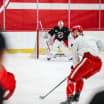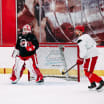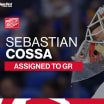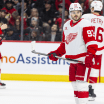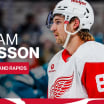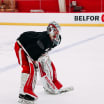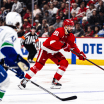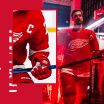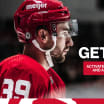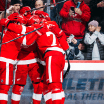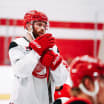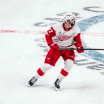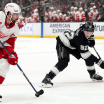TRAVERSE CITY, MI. - Over the past four days at development camp, Tyler Wright, Detroit's director of amateur scouting, has been all eyes.
With every draft pick from the Wings' past two drafts participating in this year's development camp at Centre Ice Arena, Wright is getting to see many of his picks taking their initial strides toward becoming Red Wings.
Tyler Wright on creating a Red Wings culture
Amateur scouting director encouraged about prospects, but is also focused on 2018 draft
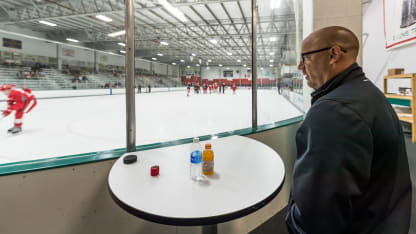
© Dan Mannes/Detroit Red Wings
By
Arthur J.Regner @arthurjregner / DetroitRedWings.com
"You're always excited when they come into this setting," Wright said. "But I think more importantly, we try to hold off a little bit on the evaluation process as far as A, it's July; B, I think the number one thing that we're trying to do as an organization as far as bringing these kids in here, it's to educate them.
"Every kid has a different resource that they need. Obviously, the principles in how to be a pro and just the 24-7, every day, what you put in your body, how to cook, all that stuff is kind of the baseline of it.
"But once you start really digging deep into the players, certain kids need to work on footwork, another kid doesn't need to work on footwork, he needs to work on skill set and combinations.
"The biggest thing when you come into these development camps is making these guys go away with more knowledge than what they had. More importantly, when you get that knowledge, how are you going to incorporate that in an everyday setting."
Many of Detroit's prospects have been on the Wings' radar for at least a few years and though they may not have known much about the history of the Red Wings when they were drafted, the Wings knew a lot about them.
Yet, despite the herculean effort the Wings scouting staff puts into researching and watching each pick; Wright realizes the system isn't infallible and he understands development camp evaluations are pointless.
"We're going to make some good picks, we're going to make some not-so-good picks. When you get 11 picks, with 50 player contracts, with the amount, not everybody can be signed," Wright said using this year's draft as an example. "But I think when you go into this process and you let these kids know that your window of opportunity now has started from the draft, now it's development camp, now we got a baseline of numbers.
"We got 19 defensemen here, almost as many as forwards. For that matter, we know internally as an organization that we need to draft and we need to develop defense. Are all 19 going to play? Absolutely not. Some of them have to play for us.
"In say, two to three to four years, that's when we sit back and we evaluate how we did on this draft. We go back and look at the 2014 draft now as a staff on what we did, what we could do better, why did we like a guy, and maybe he hasn't taken that next step and let's learn from that.
"We're constantly learning as a staff. So, for us to sit here and evaluate these kids, I think it's just too premature right now."
For years, when development camp has concluded; the Red Wings have given their prospects an itinerary they would like to see them follow over the course of the next year, regardless of what league or level of hockey they end up playing.
It is a test to determine the desire and motivation of the player. If the player follows the Red Wings way, they have given themselves a terrific opportunity to receive every tool from Detroit to succeed.
Today's players are much more aware than players from previous generations. They are committed to their quest of playing in the NHL, which makes following the Wings' itinerary essential in their development as a Red Wing.
When prospects go their separate ways, the next time they meet in a group setting, Detroit knows who followed the plan and who didn't. Usually that happens from their first development camp to their next camp a year later, but Wright says that is not always the case.
"It even goes a little bit further back," Wright said. "A guy like (Evgeny) Svechnikov. After our draft, he was a late birthday and he goes back to Cape Breton, has one year, we wanted to put an emphasis on him getting stronger, he needed to get quicker in his skating, his skating stride had to get quicker.
"He took the initiative to spend the summer here in Detroit to train with our people on a daily basis and he goes into preseason, plays two or three games, scored two or three goals, goes down to the American Hockey League, bought his time early on, had a little bit of an adjustment period to start, ended up with 50 points, 20 goals, on obviously the best team that ends up winning.
"So, the progression when those kids take that step, yeah, you get excited."
While development camp is not for player evaluation, there are two players that have left an impression thus far. These players have consistently been singled out when Detroit's hierarchy has been pressed to mention some development camp standouts.
The players are defensemen Vili Saarijarvi and Filip Hronek. Saarijarvi, picked in the third round, 73rd overall in the 2015 draft and Hronek, a second-round pick, 53rd overall from the 2016 draft, are veterans of Detroit's development camp and their willingness to accept Detroit's instruction and constructive criticism has not gone unnoticed.
"Those two guys (Hronek, Saarijarvi), I think the emphasis is on them because they bring a skill set that is really hard to teach. A lot of it you can't teach," Wright said. "You can get better but they think the game and they have the skill set to be able to work on the power play, be those type of guys.
"When you see them physically get stronger, you see them coming into this camp and being one of the leaders this year, rather than a guy that's just kind of in the mix, yeah, it gets you excited.
"Now it's just the tip of the iceberg. You got to keep them grounded, you got to make them earn their time, they're both turning pro this year. The process has started and you like the way that they're going. They still got a long way to go."
Other players have also stood out, with Wright mentioning defenseman Dennis Cholowski and forwards Givani Smith and Dylan Sadowy, but Wright is a bit uncomfortable singling out players because he hopes every player is working on making themselves better.
"Once you create that culture, where you understand if you're coming to this camp, you're coming to the Detroit Red Wings camp and you're not doing the stuff that you should be doing, you're going to look out of place," Wright said. "That's the culture that we want to create and making sure that every year, it's a bad feeling being as a player, a former player, that you know inside if you've done the work or not, and if you go to camp and you're out of place, it's not a good feeling."
Wright was leaving development camp after Monday's sessions were completed. He was asked what he would take away from the four days he spent in Traverse City; he indicated once he leaves development camp his mind and priorities are focused elsewhere.
"I'm actually thinking about what we have to draft next year. We're going to get a little bit more of an emphasis on higher-end skill, maybe get a little bit riskier in the forward position," Wright said. "We wanted to address it. We addressed defense this year because we deemed as a staff to be a fairly deep defense draft.
"We had so many picks, and it wasn't that we were overlooking any skill or anything for that matter, there was a clump of defensemen that we really liked that we figured were going to fall in the range where we had a lot of picks and that was from the 38th to the 102 mark."
He knows at last month's draft when he implied Detroit wanted to become a team of behemoths, it sent a panic into the Wings' fan base. Many interpreted Wright's comments that the Red Wings were evolving into a slow, plodding team of giants when the NHL is now all about speed and a high skill level.
"I don't want to mislead people by saying we wanted to get bigger and harder to play against, we also want to keep the identity of what a Red Wing is," said Wright. "When you look into the dictionary of what a Philadelphia Flyer is or what a Detroit Red Wing is, you're going to have two completely different definitions of what a player is. That's just the general philosophy of the organization. We want to keep our identity of what we are as an organization, but we want to alter it in a little standpoint and I think we did that with the defense.
"Next year we got to add some skill set guys that are going to be able to work the half-wall on the power play, guys that are going to be the pure goal scorers. When you take a little bit more of a calculated risk, you got to give something up sometimes.
"Maybe it's going to be size, maybe it's going to be a little bit on the competitive side. But you make them a little bit more competitive by surrounding them with competitive people. We got a game plan already and I think that's the biggest thing is we're handing these guys (prospects) over now to (Shawn) Horcoff and the American League hockey, the coaches and the trainers and all that stuff.
"It's about getting that next pool of players in and identifying what our organization needs. It's starting already."
A perfect hockey team has never been built, but that will not stop Wright and every other NHL director of amateur scouting from trying.



